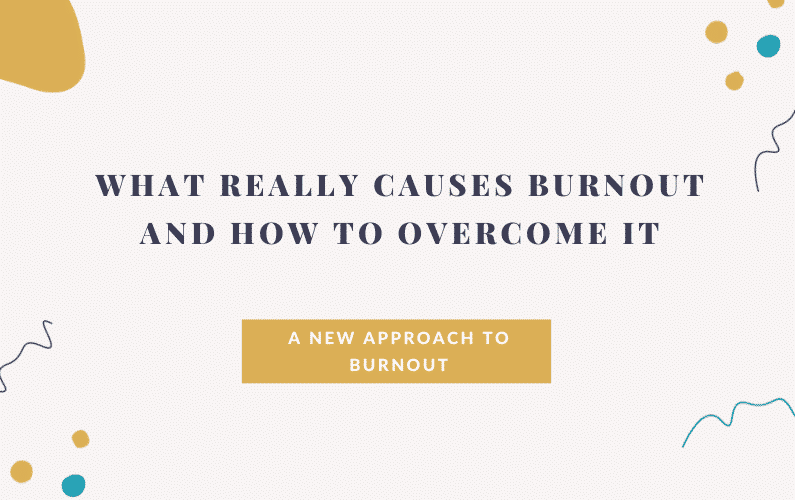
Most of the conversation around burnout today is grounded in overworking. The belief is that when we work too hard or too much, we burn out. That argument isn’t entirely false, but I don’t think it’s the full story. If that were true, then why is it that some people can work 12 hour days and still feel great?
Burnout syndrome comes from more than the hours we put in. It has a lot more to do with overworking our minds and the things we tell ourselves to fuel that work. Once we understand this, we can work on changing our thoughts so we can feel less depleted from and more energized about our work.
The real cause of burnout
Burnout is way sneakier than we think. It’s easy to equate long work hours with burnout, but that’s actually a fraction of the equation. What if I told you burnout syndrome isn’t only about overworking yourself to depletion or illness? Would you believe me if I said burnout symptoms come from your thoughts and feelings? From an overly busy mind stewed in negative emotion? Well, I’m here to convince you.
The negative thoughts and feelings we use to fuel our work cause burnout. At a basic level, burnout syndrome is what happens when we try to fuel positive actions or outcomes with negative thoughts and feelings.
Let that sink in.
When we use shame, anxiety, or fear to get ourselves to behave in a certain way or do a certain thing to achieve a result, we exhaust ourselves. These are heavy emotions and these feelings come from the negative thoughts we have. Ever yelled at yourself (in your brain) that if you don’t achieve X, you’ll get/become Y? And therefore you have to do Z? I certainly have.
It makes sense that we do this because we’ve been raised to operate this way. In elementary school we’re taught if we don’t do well, it means we’re stupid or lesser than. So from elementary through college, we fuel our studying (a positive action) with thoughts like “if I don’t ace this exam I won’t get [insert opportunity]”.These seemingly positive outcomes, like doing well on an exam, are driven by fear – a fear of being lesser than.
These negative thoughts fuel our imposter syndrome, which makes us more anxious and stressed about our abilities and worthiness. So, we push ourselves harder and exhaust our brains and bodies further, fueling our burnout.
If you’re still on the fence about how our thoughts fuel burnout, let me ask you this: how many hours a week do you spend thinking about work or your problems? Worrying that you’re not enough or doing enough? Even if you hypothetically put in 40 hours a week of actual work (a normal workweek for most), I bet you can tack on an additional 20 hours at a minimum that you spend ruminating about your challenges or inadequacies, which cause feelings of stress and anxiety.
Your mind is always working – running. When you let it run non-stop on negative thoughts, you’ll fry your circuits.
Clearly, most of us are “working” a lot more than the typical 8 hour day running negative scripts in our minds on replay. Given that, it’s no wonder most of us are burned out before we even begin our workday. To overcome and prevent burnout syndrome, we need to manage our minds – we need to change our negative thoughts.
What happens when we fuel positive action with negative thoughts
The more burned out we are, the more catastrophizing our brain does. When our brain is in this panicked state of scarcity, many of us try to outrun our negative thoughts and emotions by adding more things to our plate. That way we feel more productive and that we’re doing something instead of actually dealing with the stress – dealing with our thoughts.
Some people try to layer optimism on top of their burnout as a way of coping. They don’t want to admit something isn’t working and try to stay positive. Faking this positivity, or trying to convince ourselves we’re doing fine is also exhausting. Our body is feeling one way and instead of dealing with our thoughts, we try to force yourselves to believe and feel something different.
We think this is how we’ll be productive, but we don’t realize how much it costs us. It’s like using coal for energy. Sure, it works, but it damages the environment and burns the air. This methodology has consequences. That’s why we can accomplish so much, get all the proverbial “gold stars”, and still feel terrible.
When we fuel positive action with negative thoughts, we look at all our accomplishments and still think we’re imposters – because it was that fear of not-enoughness that fueled our action in the first place. We then can’t enjoy our accomplishments, which feels terrible, and further perpetuates our burnout. We never feel that break – that sense of completeness – it’s an endless cycle of running laps trying to feel something that we can’t feel as long as our accomplishments are fueled by negative thoughts.
Let me ask you this: how many accomplishments do you have that when you think about them, you feel guilt or anxiety? That they’re not enough? That you could have done better?
You might try to numb yourself by taking more action – by reading more articles, taking more courses, listening to more podcasts. All of this to feel like you’re productive and moving forward, but none of it changes your thoughts and therefore, how you feel.
How to overcome and prevent burnout right now
When you change your thoughts and stop guilting yourself into action, you can choose intentional thoughts that will produce positive (or at the very least neutral) feelings as fuel. Then when you actually accomplish something, you will feel like enough. You will stop spending hours on hours worrying about not being enough and you will put a stop to the vicious cycle fueling most of your burnout.
This takes practice and a willingness to feel uncomfortable while you rewire your brain (i.e. not numbing out by taking more action to distract yourself or pretending everything is fine). Here’s what you can start practicing today to overcome and prevent burnout:
Enjoy the now
Step out of the fantasy that everything will be better later. Living in the future and believing everything will be great when you do X or have Y is a toxic fantasy that never really plays out. Using negative emotion as fuel to take positive action and achieve your desired outcomes leads to more negative emotions. Positive feelings, on the other hand, get us to keep going even when we miss our goal. It’s fun and energizing to work from a place of joy – the antithesis of burnout.
So, how can you start enjoying the now? Look around for something you already like. Careful here, it’s not a thought about what you should like or something you need to convince yourself you should like. “Brightsiding” leads to burnout – don’t badger yourself into liking something. Instead, look for something you actually appreciate and enjoy right now. Maybe you like your coworkers, maybe you like working from home, or maybe you like being in charge of your own schedule. The point is to notice what you already like and enjoy it on purpose. Noticing things you already enjoy feels good and helps you to start rewiring your brain to have positive thoughts that generate positive emotions.
If you try this and catch your brain saying, “I don’t like anything!”, say to your brain, “ok, but if you did like something, what would it be?” Fuel yourself with positive emotion and then celebrate the shit out of it.
TLDR
Our thoughts affect our feelings which affect the actions we take and the results we generate. If you have negative thoughts (like not-enoughness), which make you feel fear or shame, they’ll cause you to take on more to feel productive or capable (an action fueling burnout) or freeze in anxiety (an action causing more stress), all of which lead to more burnout (the result).
If you’ve been struggling with burnout, try working on your thoughts. It’ll take time (this isn’t a quick fix!), but it’ll have a domino effect in diminishing your burnout.
Sign up to get weekly insights on how to create your version of success
Join the hundreds of founders and leaders already getting them in their inbox every week. Word on the street is they are insightful, entertaining, and thought-provoking emails.


